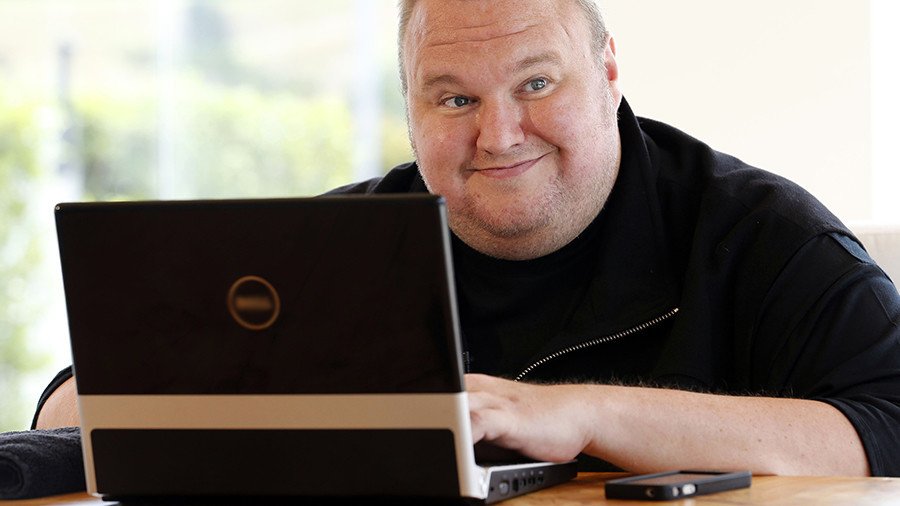Imagine! An ‘alternative internet’ not ‘completely in the hands of Facebook & Google’

A global network controlled by users, rather than being dominated by corporations like Google and Facebook will offer more security, privacy activist and software developer Dmytri Kleiner told RT, referring to Kim Dotcom’s notion of an “alternative internet.”
The founder of Megaupload, Kim Dotcom, who is wanted in America for alleged copyright violations, pledged this week to create an ‘alternative internet’ to defend online privacy and freedom.
Telecom giants in the US are set for a significant victory if Washington goes ahead with its plan to repeal so-called 'net neutrality' rules, enacted to prevent internet service providers from potentially cornering parts of the digital market and charging extra fees.
Meanwhile, global corporations like Google and Facebook are gathering ever-increasing troves of personal data from sometimes unwitting users. Just this week, Google was outed for secretly collecting location data from Android phone users, even after they turned off location settings and had no SIM card in their devices.
So is there a way to escape from the increasing arbitrariness of the ‘regular internet’?
Goodbye, IP address: @KimDotcom to launch alternative internet https://t.co/bYx7hHcd9F
— RT (@RT_com) November 22, 2017
RT: What are your thoughts on Kim Dotcom's idea? How is it possible to build an alternative internet?
Dmytri Kleiner: The current internet as it exists right now suffers from a lot of privacy concerns. A lot of those privacy concerns – some of them are inherent to the architecture of the platforms, but a lot of them are related more to the business models of a lot of the kind of companies that make money on the internet. Companies like Google and Facebook make their money by targeting advertising. And targeting advertising requires to know a lot more about you than untargeted advertising. So the more they know about you, the more they can sell these ads for.
Kim Dotcom's proposal is not something that I’ve seen too many details about, although he has been mentioning MegaNet for a few years now I think, as early as 2015. And there are a lot of things that sound pretty good about what he is proposing. Especially the idea of using mobile devices more actively. It is not clear what he means by that – whether he means there will be an overlay network on top of the kind of IP internet that adds anonymity along the lines of something like Tor or Tox; or whether he plans to use Bluetooth, or NFC (Near Field Communication,) or direct Wi-Fi capabilities of the mobile phones themselves to create a so-called mesh network along the lines of Briar or several other applications. But in any case, more development in this area would certainly be good – the better platforms that consumers have that deliver privacy and anonymity – the more we have – the better. But that won’t necessarily affect the actual concerns of data being collected by the likes of Google and Facebook.
#NetNeutrality essential to keep freedom associated with #internet' - Canadian PM https://t.co/V1ebTLi807
— RT (@RT_com) November 24, 2017
RT: What about the speed at which people can use the internet. With these net neutrality rules being rolled back is Kim Dotcom's idea a way of circumventing those alternative rules that are going to come into force?
DK: We need to know more about the architecture to make a claim either way. If it is planning to use the kind of radio capabilities of mobile phones themselves, and the Bluetooth and NFC and Wi-Fi capabilities those phones have to create another mesh network, then you could have an advantage that it is much more difficult to block than centralized things. So net neutrality wouldn’t affect it directly. However, it is still may be a slower service to what people used to right now, given a neutral internet.
RT: What would be the drawbacks be to an alternative internet? Some people might say there is too much anonymity, and perhaps there would be sort of fair game for criminals and the like? What’s your response to that argument?
DK: It seems to me the criminals aren’t having a terrible amount of difficulty operating on the internet as it is today. Having a more alternative internet that is more controlled by its users, gives us better options in order to protect ourselves. We can have collaborative moderation, and collaborative block lists and stuff like that that could make user-driven ways to defend against this stuff more effective, rather than being completely in the hands of Facebook and Google and Twitter, and only being able to access the protections that they provide.
‘Govt's most experienced privacy cop’: How the FCC’s reversal of #NetNeutraility may affect you https://t.co/23cWehe1eMpic.twitter.com/myZYGW2zeX
— RT (@RT_com) November 22, 2017
RT: Can you see the public taking to this alternative internet quickly, or would there be problems for them to connect? What are your thoughts on its accessibility?
DK: There are a lot of questions need to be looked at there. One is how user-friendly and usable this kind of stuff is. We know without a clear business model, like advertising that Facebook and Google have, you have to question where the investments are going to come from to create the kind of rich user experience that users are used to; to market it, to promote it, to support it – and all that kind of stuff. I mean given the right support I definitely think that an alternative could be made and it could be very popular.
However, it is not clear where that support could come from short of public institutions because as a private entrepreneur Kim Dotcom can only spend money that he can earn back. And it is not clear how he would earn money on such a thing, given that advertising and surveillance would not be used.













